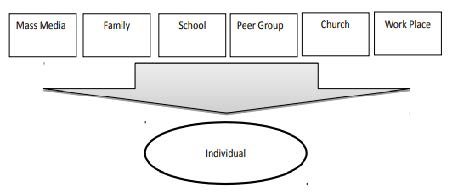Context, content, processes, and consequences of socialization
Man as a social being needs other people to survive. We develop ourselves as human beings through our social interaction. Socialization is a continuing process whereby an individual acquires a personal identity and learns norms, values, behaviour, and social skills appropriate to his and her social position. Socialization refers to the process by which an individual is oriented and taught by his or her society’s norms.
Socialization can be described from two points of view: objectively and subjectively.
Objective Socialization- refers to the society acting upon the child.
Subjective Socialization- The process by which society transmits its culture from one generation to the next and adapts the individual to the accepted and approved ways of organized social life.
This perspective on socialization helps identity formation of individuals which is essential in establishing her/his social skills. Its functions are:
| Personality Development | It is through the process of socialization that we develop our sense of identity and belongingness. |
| Skills Development and Training | Social skills like communication, interpersonal and occupational are developed. |
| Values Formation | Individuals are influenced by the prevailing values of social groups and society. |
| Social Integration and Adjustment | The socialization process allows us to fit-in an organized way of life by being accustomed including cultural setting. |
| Social Control and Stability | Integration to society binds individual to the control mechanisms set forth by the society’s norms with regard to acceptable social relationships and social behaviour. |
Socialization continues to be important part of human development. It is an instrument on how an individual will adapt to his existence to survive. The process of socialization enables the individual to grow and function socially (Medina, 1991 p. 47). Hence, the change in man’s social reality modifies his culture. The culture becomes internalized that the individual “imbibe” it. This influences his/her conduct.

Agents of Socialization These refers to the various social groups or social institutions that play a significant role in introducing and integrating the individual as an accepted and functioning member of society (Banaag, 2019 p.138)

The agents of socialization guide every individual in understanding what is happening in our society. People learn to determine what is proper, right or wrong. Social norms were formed in order to control the individual behaviour in the society.
The following are forms of social norms.The agents of socialization guide every individual in understanding what is happening in our society. People learn to determine what is proper, right or wrong. Social norms were formed in order to control the individual behaviour in the society. The following are forms of social norms.
Folkways – Customary patterns that specify what is socially correct and proper in everyday life. They are repetitive or the typical habits and patterns of expected behaviour followed within a group of community.
Mores- They define what is morally right and wrong. These are folkways with ethical and moral significance which are strongly held and emphasized.Mores- They define what is morally right and wrong. These are folkways with ethical and moral significance which are strongly held and emphasized.
Laws- Norms that are enforced formally by a special political organization. Component of culture that regulates and controls the people’s behaviour and conduct.
Taboos- behaviours that are absolutely forbidden in specific culture.Several Theories that explain the existence of deviants (human/groups) and deviance (acts)Social Control Theory-deviance is primarily caused by a lack in stronger social bonds within a society.
Rational Choice Theory- the individual’s decision to follow or to go against social norms is dependent on their perceived cost and benefit of such action.
Differential Association Theory- conformity or deviance is learned by an individual from those he or she associates with.
Labeling Theory- actions are initially not considered deviant until they are labelled as such by members of community.
Conflict Theory- society consists of opposing groups of people whose access to power is unequal.
Structural-functionalist Theory- this theory proposes two perspectives in the formation of deviant behaviour.
Two elements that promote social control:
1. Internalization- is an integral part of communicating and incorporating social norms to an individual’s personality.
2. Sanctions- powerful in leading an individual to conform to social norms.
Types of Sanctions:
-
- Formal Sanctions- these are the rewards of forms of punishment that are formally awarded by an institution such as government, council or establishment.
- Informal Sanctions- these are the rewards and forms of punishment that are spontaneously given by an individual or a group of people as a response to a behaviour that was either accepted or disapproved.
- Positive Sanctions- these are the actions or statements that reward a particular behaviour, which reinforce its repetition.
Status- is an individual’s position in his or her society, which carries with it a set of defined rights and obligations.
Roles- the sets of expectation from people who occupy a particular status.
Conformity- is the act of following the roles and goals of one’s society.
Deviance- the act of violating the prescribed social norms.
Primary identity- consist of the roles and statutes that an individual learns as a a child.
Comments:

